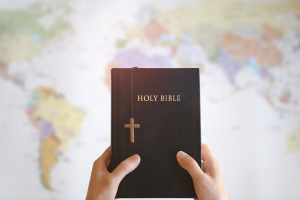Churches and political power: Beware the whales

Like the whale that swallowed Jonah, a great gullet awaits churches that venture far into the dark deeps of politics. Despite the danger, churches and their leaders must venture into those perilous waters as surely as Jonah needed to wind up on the coastlands of Nineveh.
Churches must see the political realm as a place of mission and ministry because so many contemporary issues center on worldview, values, morality, and other issues that are spiritual at their core. People need guidance and churches need to be prepared to provide it.
For leaders and members of churches to remain silent now would be a travesty like that of the silence of southern white churches during the age of slavery and the buildup to the War Between the States.
Churches seeking political power need not only to be passionate and savvy, but, as Jesus said to His disciples long ago, “wise as serpents” (Matthew 10:16). There is time now to think seriously about political involvement before stepping into the whale and shark-infested waters.
Here are some important things I have learned as a presidential aide, as a political candidate, as a Congressional staffer, and as a pastor and avid student of the Bible’s relationship to social, cultural, and political engagement:
1. Churches and their people must understand who they are before they jump into the domain of the big fish. The “whale” of a political party, cause, and/or candidate, will not only use you but do all possible to squeeze you into its image. As the Church, you are the “ambassador of Christ” (2 Corinthians 5:20), not the pawn of a party or worldly Kingdom. The true church is the “embassy” of the Kingdom of Heaven in the fallen world and must never forget Whom she represents.
2. Aligned with that, the second issue churches and their people diving into the political waters must settle before the jump is: “Why am I/we doing this? This calls for a clear vision of telos-purpose. Christians entering the big ocean of politics are not on a luxury cruise, but on mission to bring Christ Himself into the contest.
3. The third critical concern before churches engage with the political realm is a clear understanding of the differences between authority and power. Churches are to be in public affairs under the authority of God’s Word (thus answerable to Him) not as mere power-seekers or power-brokers. The Church in the Middle Ages failed to discern the distinctions between true authority and raw power and lost their mission and ministry. Here are important differences between true authority and mere raw power:
True authority is granted while mere raw power is grabbed.
True authority is granted to those under authority, but mere raw power is seized by those who answer only to themselves or the power structures in which they operate.
True authority is sustained through relationship and servanthood, but raw power through sheer muscle using intimidation, condemnation, manipulation, and domination.
4. Don’t align yourself with people and movements that will destroy your integrity and mission as ambassadors for Christ in the fallen world.
5. Get ready to be derided and even hated. You may be surprised when you are scorned not only by opponents in political conflicts, but also by those within your own party and groups.
6. Focus more on mobilizing individuals within the Church than the Church as an institutional presence. Again, this is one of the vital lessons of history, beginning with Jesus, when He told His followers: “You are the salt of the earth and the light of the world” (Matthew 5:13). The Lord spoke those words early in His earthly ministry. Pentecost had not yet come. What would be the corporate body, the Church, had not yet been birthed. It was individual human beings, recognizing His lordship and filled and anointed with and by the Holy Spirit who comprised the “salt” that He would send into the world. At the other end of His mission on earth, Jesus, in the Great Commission, (Matthew 28:18-20) gave clear instruction that the work of the Church is to equip its people to continue the work of Christ as His body in the world.
Thus, the focus of a church should be the equipping of its people with sound biblical doctrine, clarity of the values that motivate and steady them in the tempests where the whale lurks. Churches should teach their members about political, social, and cultural issues through sermon series, seminars, and conferences, and mobilize them to vote in accord with the Judeo-Christian worldview.
But again, through all this, the church itself as an institutional body must not forget who she is. As the body of Christ, through her people, she is in public life to function pastorally in the whole of the public sphere, giving biblical guidance, helping heal people ravaged by the corrupt culture (even opponents), and also prophetically, daring to speak against the culture’s corruptions.
Such activities will attract pods of killer whales. Churches in the political waters must resist triumphalism — the hubristic delusion that the passage in the waters is a voyage on an “unsinkable” ship. The Church is not the Titanic.
Finally, churches must not assume that their engagement with the political sphere is an occasional excursion, but an on-going operation. They must stay informed about issues and the biblical worldview and remain spiritually fit and ready.
Wallace B. Henley is a former pastor, daily newspaper editor, White House and Congressional aide. He served 18 years as a teaching pastor at Houston's Second Baptist Church. Henley is author or co-author of more than 25 books, including God and Churchill, co-authored with Sir Winston Churchill's great grandson, Jonathan Sandys. Henley's latest book is Who will rule the coming 'gods'? The looming spiritual crisis of artificial intelligence.



























